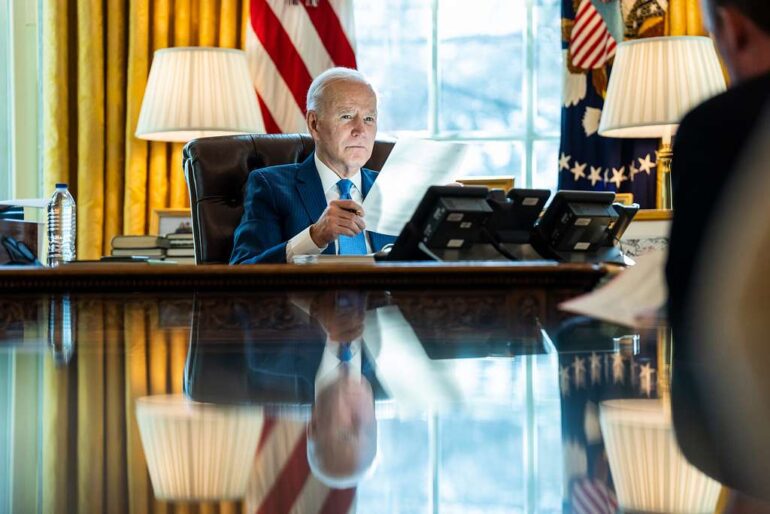Reports have circulated in recent days that Iran shared its plans to attack Israel this past Saturday night with the United States. It has even been alleged by Reuters that Washington green-lit the attack so long as it was “within certain limits.”
While some might wonder why the Americans would agree, even tacitly, to an Iranian attack against Israel, and then play a significant role in countering that attack, the most plausible answer is that this ostensibly inconsistent behavior is actually part of an increasingly transparent picture of how US foreign policy envisions the Semitic region and Israel’s place in it.
The Biden administration’s “advice” for Jerusalem to “take the win” and not retaliate against Iran is consistent with the administration’s previous insistence that Israel not enter Rafah, as well as its constant criticism of aggressive Israeli military incursions in Gaza.
The larger picture coming into focus for many Israelis today is that the United States simply doesn’t want Israel to win.
A dramatic Israeli victory, like that of the 1967 Six Day War would be a disruption of Washington’s regional interests. It’s preferable from the empire’s perspective to maintain a balance of power between several regional actors, including Iran and the Sunni regimes. None should become too powerful and as many as possible should come under Washington’s direct control.
This isn’t to say that the United States seeks Israel’s destruction. The empire is happy for Israel to exist as a westernized extension of American power in pre-67 borders. Washington wants Israel to exist so long as it exists as a dependent. To this end, US policy makers have consistently worked to keep Israel in a perennial defensive posture – a posture that precludes the possibility of any meaningful victory or demonstration of regional dominance.
This policy of constraining Israel from taking offensive actions has so far been achieved not only through the American stick of stern warnings but also through the carrot of lavish support on Israel’s defensive needs – such as aid for air defense systems like the Iron Dome.
Recognizing this larger picture of the empire’s agenda for the region enables a clearer understanding of Washington’s long standing bi-partisan obsession with partitioning this land into two separate states.
It’s difficult to believe that any US policy maker genuinely believes a “two-state solution” could end Israel’s conflict with the Palestinians. In fact, it has become obvious in recent years that partition, from an American perspective, isn’t a simply a means to reach the goal of Israeli-Palestinian peace but rather the goal in and of itself. Washington seeks to partition this land into two states with the full knowledge that the conflict would likely continue following that partition.
In addition to robbing Israel of the territories where the Jewish people’s roots run the deepest, a Palestinian state in the West Bank would further force Israel into a perennial defensive posture. In a two-state scenario, Israeli incursions into Palestinian communities would become invasions and would therefore be far more subject to condemnation and isolation.
It is therefore crucial that we recognize the American obsession with partition as a central component of the American agenda for our region – an agenda that renders Israel completely dependent on the empire.
Because so many Israeli policy makers, journalists and even military experts have already bought into a conception in which Israel’s survival is dependent on a close relationship with Washington, Jerusalem has slowly allowed itself to come under US control in recent decades. This has already neutered Israel’s ability to use offensive force and led us to a junction where it’s become critical to understand that if we’re not willing to incur Washington’s inevitable wrath by asserting our sovereignty and pursuing our own national interests, Israel’s independence will be further eroded and our survival in the region increasingly dependent on US power.
This nightmare scenario of a completely neutered Israel can be avoided but it demands a sober analysis of the US-Israel relationship, as well as a determined responsible leadership to reverse the trend. Such leadership certainly won’t come in the form of former generals with no conception of Israel’s interests beyond a close relationship with Uncle Sam.
For better or worse, the only Israeli leader who even seems to be aware of Israel’s dire situation is our current prime minister. No other realistic contender for the nation’s top seat appears even mildly interested in decreasing our dependence on Washington and positioning us as capable of breaking free. It’s no wonder the Americans work so hard to remove him from office.





